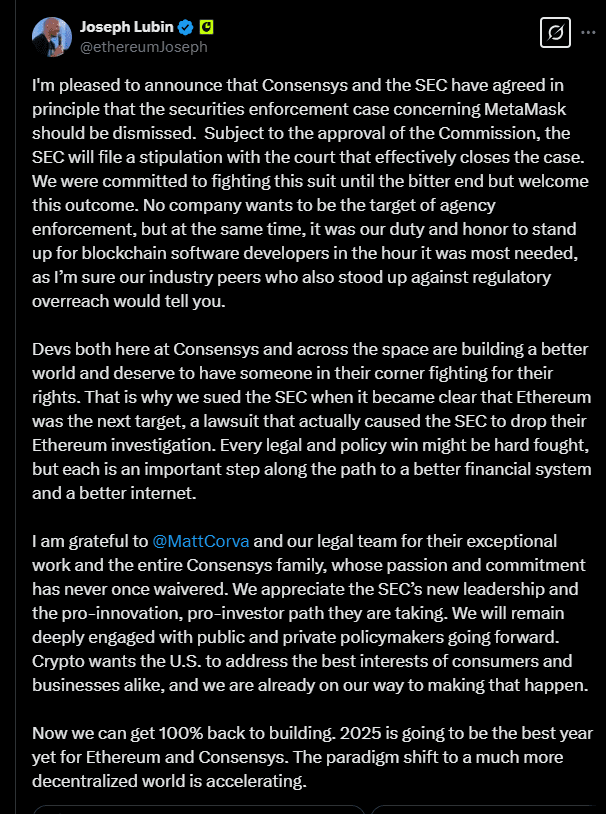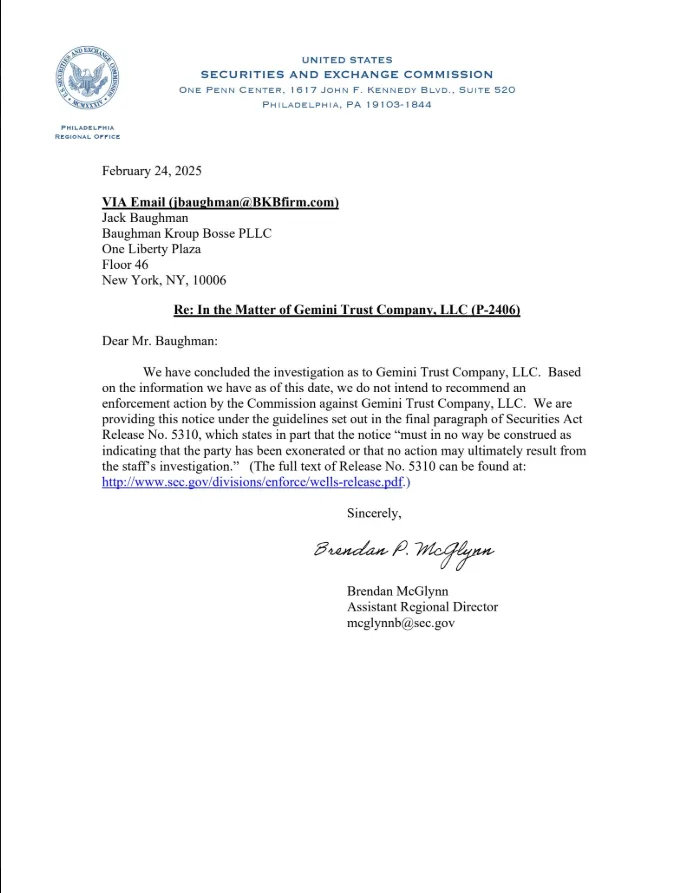TLDR
- The SEC has dropped investigations into both Consensys and Gemini.
- The litigation has cost these companies millions of dollars in legal fees, which is tough to pay when the company is debanked.
- Despite the hardships, both companies are breathing sighs of relief.
The U.S. Securities and Exchange Commission (SEC) has agreed in principle to dismiss its lawsuit against blockchain firm Consensys.
The case centered on allegations that functions of MetaMask, a popular cryptocurrency wallet developed by Consensys, violated securities laws.
For Consensys, it’s a reprieve from what could’ve been a lengthy and costly legal battle. But for the greater crypto industry, it may feel like a slight cooldown in what many have perceived as a regulatory war.
The Good News
Ethereum co-founder and Consensys founder Joseph Lubin shared the news on X (formerly Twitter), stating that the SEC intends to file a motion to effectively close the case.
Lubin’s statement was cautiously optimistic, as he said, “I’m pleased to announce that Consensys and the SEC have agreed in principle that the securities enforcement case concerning MetaMask should be dismissed. Subject to the approval of the Commission, the SEC will file a stipulation with the court that effectively closes the case. We were committed to fighting this suit until the bitter end but welcome this outcome.”

Gemini Investigation Also Concludes
The Consensys case isn’t the only recent regulatory win this week for the crypto community. Gemini, another major player in the space, found itself under SEC scrutiny regarding its “Earn” program.
The federal regulator charged both Gemini and Genesis Global Capital earlier this year with offering unregistered securities through the program.
On February 26, Cameron Winklevoss, Gemini’s co-founder and president, announced that the SEC has also closed its investigation into the company. According to Winklevoss, the SEC informed Gemini’s legal counsel that it would not be recommending an enforcement action — at least for now.
However, as with most things involving the SEC, there’s a caveat. The closure of the investigation “must not be construed as an indication that no action will be taken at a later date,” a statement from the SEC read.

Winklevoss didn’t hold back on sharing his frustration about the experience, saying on X, “This marks another milestone in the end of the war on crypto… [but it’s] little solace given the damage this agency has done to us, our industry, and America.”
He went on to describe the financial toll of the investigation, citing “tens of millions of dollars in legal bills” and “hundreds of millions in lost productivity, creativity, and innovation.”
A Shift in the SEC’s Crypto Strategy?
This series of case closures, including recent decisions involving Coinbase, OpenSea, Robinhood, and Uniswap, might suggest a pattern of retreat — or at least a slowing pace — for the SEC’s enforcement crusade against crypto firms.
Yet, for those keeping score, legal dramas involving the SEC tend to drag on. While crypto companies may celebrate these rulings, bigger questions loom about the agency’s long-term approach toward digital assets.
Critics of the SEC’s strategies have pointed to these cases as evidence of overreach. Some argue that the agency stifles innovation without providing clear regulatory guidelines for businesses to follow by targeting crypto innovators with drawn-out investigations and costly lawsuits.
Joseph Lubin’s closing remarks highlighted this sentiment, expressing relief over the lawsuit’s dismissal and emphasizing the responsibility crypto innovators feel to push back against what many see as regulatory overreach. “No company wants to be the target of agency enforcement,” he said, “but at the same time, it was our duty and honor to stand up for blockchain software developers in the hour it was most needed.”
What Does This Mean for Blockchain Beginners?
All this regulatory back-and-forth might seem overwhelming and exhausting for newcomers to the crypto and blockchain scenes. But here’s why it matters to you:
- Confidence in the Ecosystem: These legal victories signal that at least part of the crypto space is pushing back — successfully — against unclear or burdensome regulations.
- Pro-Crypto Administration: The new administration has been crypto-friendly since it was on the campaign trail. The president kept many promises when he signed a recent executive order.
- Resilience of the Industry: Cases like those against Consensys and Gemini showcase that the crypto world isn’t backing down. For users, that means more opportunities for innovation and access to better tools in the long run. It also signals that the people willing to fight for this industry are willing to fight for what they have and what they believe in.
Where the Industry Goes From Here
With both the Consensys and Gemini investigations winding down, the “war on crypto,” as Winklevoss put it, has reached a turning point.
We’ve had the feeling for a while that the winds of change were upon us. Despite the red markets, we see more and more news every week that confirms our thoughts.
For new users and blockchain enthusiasts, follow trusted sources (like us!) and keep an ear out for updates on major regulatory cases. This era of regulatory drama has sparked new conversations about balancing innovation and compliance in the world of digital assets. Let’s see where it goes from here.












